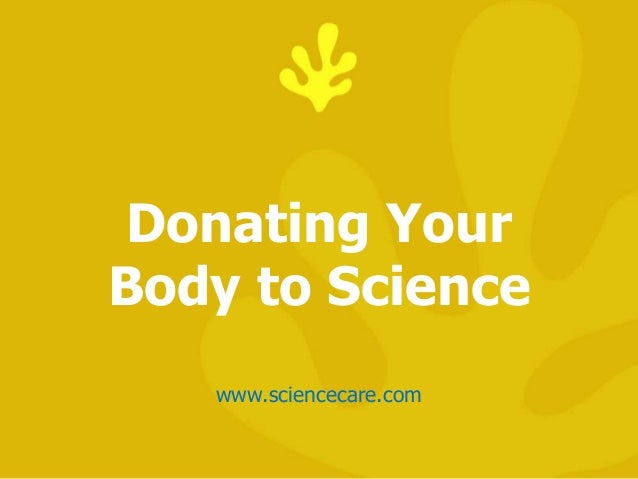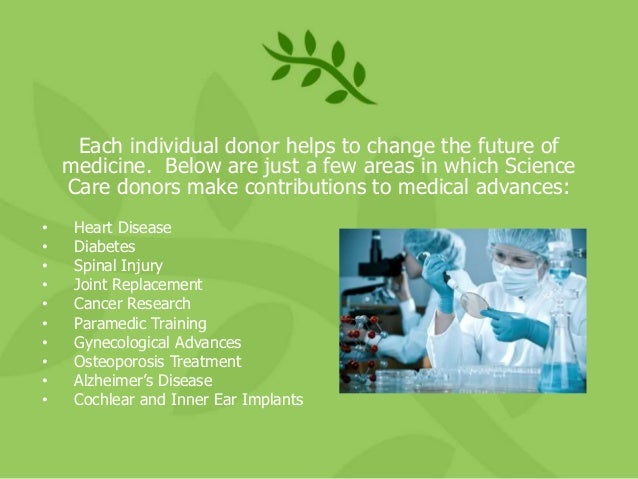How does donating your body to science really work?
Nov 19, 2021 · If you want to donate your body to medical science, you will have to give written and witnessed consent before you die for it to be deemed acceptable. To find the nearest medical school near you and get a donor pack, click here. A backup plan if …
What could happen if you donate your body to science?
How do I arrange to donate my body to science? Call us 24 hours a day at (800) 417-3747 ext. 1. A Science Care representative conducts a brief medical screening by phone to determine acceptance (If you're enrolled in the Science Care HOPE® Program, this step may have already been completed for you).
Why you might want to donate your body to science?
Keep The Body, Donate The Usable Parts If you want to help others, but still want your family to bury or cremate your body, you can simply donate your organs. Next time you renew your driver’s license select the box that says “organ donor.” Check out this article for all the info you'll need.
Why should you donate your body to science?
Jul 17, 2019 · The first step in donating your body to science is to contact a local medical school or facility for further information. The Human Tissue Authority (HTA) is the organisation responsible for licensing and inspecting medical schools, hospitals and other scientific facilities that accept body donations.

What disqualifies you from donating your body to science?
The potential donor has an infectious or contagious disease (such as HIV/AIDS, hepatitis B or hepatitis C, or prion diseases). The next of kin objects to the donation of the body. The body is not acceptable for anatomical study (extremely emaciated or extremely obese).
Do you get money donating your body to science?
Donating Your Body to Science for Money is Illegal One thing to keep in mind is that no matter how much the school or organ network needs your body, they won't pay you for it. By law, they are unable to actually purchase bodies to use for science. Can you imagine what life would be like if they did?Mar 3, 2022
Can you donate your body to science while alive?
An accredited organization or nonprofit, like a university donation program, screens potential donors while they're still alive. It's a thorough medical vetting that can include questions about past illnesses and surgeries, IV drug use, and communicable diseases.Sep 23, 2018
How long do they keep your body when you donate it to science?
Though the body still breaks down, a preserved one can last anywhere from 18 months to 10 years. Once the medical school students or researchers are done with it, a memorial service is held, usually once a year.Dec 28, 2017
Why do people donate their organs?
For those who do the latter, it's often because the life of someone they care about (or their own) was saved with medical technology or a certain procedure.
Who is Marsha Durkin?
Marsha Durkin is a Registered Nurse and Laboratory Information Specialist for Mercy Hospital and Medical Center in Illinois. She received her Associates Degree in Nursing from Olney Central College in 1987. wikiHow marks an article as reader-approved once it receives enough positive feedback. This article received 82 testimonials and 94% ...
Can you specify what kind of studies your body will be used for?
You cannot specify what kinds of studies your body will be used for. Anatomical study through dissection is not always the case. Researchers in criminal forensics, for example, may expose cadavers to various environments in order to observe how they decompose. Make sure you research these possibilities and concerns before you make your decision.
Can you donate your body to science?
Nope! Donating your organs to the transplant list is much more straightforward, but when you donate your body to science, you won't know exactly how your body will be used. As you research facilities, be sure to ask how most donated bodies are used.
What is cadaver used for?
Instead, your cadaver will most likely be used for teaching purposes in medical schools. Sometimes, donated corpses even help teach forensics teams how bodies decompose, like in the program at the University of Tennessee's Forensic Anthropology Center. 18:35.
Is it legal to sell body parts?
It is legal to sell bodies and body parts in the U.S., and some people choose to use brokers because they market their services and will cover the costs of claiming and transporting the body. Of course, then they will go on to sell the body parts, and the system is not closely regulated.
Educate The Next Generation: Bequeath Your Body To A University For Students
If you’d like to help first-year medical students learn about the human body, this is the choice for you. Forget all the movies and TV shows you’ve seen where crazy co-eds use cadavers to play pranks on one another. This is serious business and hands-on experience with actual bodies is vital for them to become real doctors.
Help Doctors Stay Sharp: Assist Doctors In Refining Their Skills
Maybe the idea of having untrained med students prodding your body scares you. If so, you can still be generous and give your body to the Medical Education and Research Institute in Memphis TN, where trained doctors use your body to learn new techniques and refine old skills.
Carefree Approach: Independent Donation Programs
For individuals who want to donate their bodies and avoid any costs to them or their families upon passing, this is a great option.
Keep The Body, Donate The Usable Parts
If you want to help others, but still want your family to bury or cremate your body, you can simply donate your organs. Next time you renew your driver’s license select the box that says “organ donor.” Check out this article for all the info you'll need.
How to donate your body to science?
The first step in donating your body to science is to contact a local medical school or facility for further information. The Human Tissue Authority (HTA) is the organisation responsible for licensing and inspecting medical schools, hospitals and other scientific facilities that accept body donations. It has a useful list of medical schools, which ...
What happens when you donate your body to medical school?
When a donor body arrives at a medical school, it’s embalmed by a technician. Sometimes, certain organs or body parts will be removed and dissected to expose bones, tissue or tendons for studying .
Why do we need body donations?
Body donations for anatomical examination are vital for the education of future healthcare professionals, in scientific research and improving medical procedures. Your body could be used to teach medical students how the body is structured and functions, the development of surgical techniques or procedures, or other scientific studies.
Why is tissue donation important?
Body, organ, and tissue donation is vital for researchers to improve their understanding of how diseases start and progress, and what keeps us healthy. There is no substitute for human tissue when studying the human body. Through donation, scientists are able to advance our understanding of disease and the development of new treatments.
Is it the same as being an organ donor?
Body Donation 101. Donating your body to science is not the same as being an organ donor. Whole-body donation is slightly more complicated because there’s no single organization or network that oversees the process of matching donors with research programs and medical schools.
What is body donation?
Body donation to science is a way to leave your mark on the world. The gift of donation allows medical researchers and educators to practice, learn, and create new techniques that continue to improve and save lives. Learn about body donation.
What is science care?
Science Care is a body donation to science program that helps future generations through improved scientific research and education.
Why is it important to be a doctor?
This is really important, because anatomical variation cannot be easily learnt using a model or computer simulation.
Who is Cecilia Brassett?
Cecilia Brassett is the current University Clinical Anatomist at Cambridge University, where she is responsible for organizing the anatomy teaching programme. She also collaborates with a number of clinicians on research projects on clinical relevant aspects of topographical anatomy.
What is committal service?
At the end of the academic year, the students take part in a committal service when all the donors have been placed in coffins and the students learn the names of the people they’ve worked on. It’s a very emotionally laden service where the students come to get to know the donors as they were in life. Some relatives provide biographical details about the donors which are really appreciated by our students.
Who is Rowan Williams?
Mary's) and the services over the past two years have been taken by Dr. Rowan Williams, formerly Archbishop of Canterbury. Students and staff participate in reading poems and tributes, and talk to the families.
Who is Kate Anderton?
Kate Anderton is a Biomedical Sciences graduate (B.Sc.) from Lancaster University. She manages the editorial content on News-Medical and carries out interviews with world-renowned medical and life sciences researchers. She also interviews innovative industry leaders who are helping to bring the next generation of medical technologies to market.

How Does One Donate Their Body to Science When Death Is Near?
- If a loved one is near death or on hospice, call us at 866-670-1799 24 hours a day to discuss your options.
The Donation Process
- Once you made your wishes known and pre-registered, then nothing else is necessary until your death, at which time your next-of-kin should contact BioGift immediately. Please let your next of kin know if you are placed on hospice or go into the hospital with an illness or situation that could cause your death, contact us immediately. A representative from BioGift will go through a medic…
Finishing The Donation Process
- The donation process takes approximately eight to twelve weeks to conclude. By this time, the family or next-of-kin will have received the cremated remains, and two certified copies of the death certificate. BioGift will then send the family or next-of-kin follow up correspondence about donation, and your last charitable effort will be finished. If you want to know even more about fu…
Popular Posts:
- 1. where to donate household items nyc
- 2. how many inches to donate locks of love
- 3. where to donate toys brooklyn
- 4. where to donate cars for charity
- 5. where to donate fresh fruit near me
- 6. how to donate a couch to goodwill
- 7. where can you donate bone marrow
- 8. where can i donate a mattress in raleigh nc
- 9. how much did tom brady donate to barstool
- 10. where did andrew carnegie donate his money